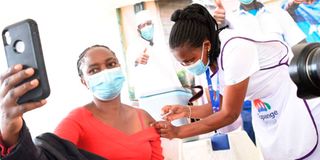Kenyans keep off Covid-19 booster shots

A woman takes a selfies as she receives Covid-19 vaccination at Dagoretti Deputy County Commissioner's offices in Nairobi during the launch of mass Covid-19 vaccination drive on February 3, 2022.
On Christmas day last year, the Health ministry announced that eligible Kenyans could get a Covid-19 vaccine booster shot –experts now say that this could be the trend until we are out of the pandemic.
The Health ministry’s directive meant that people who had been fully vaccinated and their duration since the second dose was six months were fit to get a third dose.
Other countries like the United Kingdom announced in November last year that adults could get their booster shots three-months after being fully vaccinated.
A booster shot is an additional vaccine dose given to people to enhance immunity against Covid-19 since studies have shown that some Covid-19 vaccines protection wanes after six months.
The Health ministry recommended that those who received two doses of either the Oxford/AstraZeneca, Moderna, Sinopharm or Pfizer, could get a third dose for a booster. While those who received the single dose received Johnson and Johnson vaccine can get a second one of the same.
Almost two months since the announcement, an analysis by the Nation reveals that only about 28 per cent of those eligible for a booster shot have received it. This is the percentage of the number of people eligible against those who have already received the booster shot –about 240, 000 Kenyans.
Data from the Health ministry shows that as of September 21, which is six months ago, more than 800, 000 Kenyans had been fully vaccinated.
This means that, as of today, Feb 21, those who received their second doses on September 21 should be able to get their booster doses.
Even as vaccination numbers go up, the booster shot uptake is still lagging but Dr Moses Mwangi, a vaccine expert told the Nation yesterday that it should not be a cause for alarm.
“Few people getting the booster shots is not a Kenyan problem, it is an African problem. We are doing better compared to other African countries. The general outlook in Africa is that we were denied access when developing countries had more than enough vaccines. If we were to blame anything or anyone for the slow uptake then it is the vaccine inequity that was thrown at us,” he said.
The Nation spoke to some Kenyans who are yet to take booster shots and they all had different reasons for their decision.
“I won’t go for a booster shot because they mixed my two doses already. I was given Moderna and AstraZeneca and now I don’t want a third type of vaccine,” Sandra Mwimali told the Nation yesterday.
Some, like Sharon Ambani, are not sure when to get their booster shot. Most of those that the Nation spoke to said they were scared of getting side effects from the booster shots.
While some people have already embraced the booster shot, a new study conducted by the Centres for Disease Control and Prevention (CDC) now reveals that immunity from the booster doses wanes after about four months.
The study showed that protection remained robust for only two months after receiving the booster dose, but it went down in the fourth month.
“Effectiveness waned, declining to 66 per cent for prevention of COVID-19–associated emergency department and urgency care encounters by the fourth month after receipt of a third dose and to 78 per cent for hospitalisations by the fourth month after receipt of a third dose,” revealed the CDC
Dr Mwangi told the Nation that because of such evidence from researchers, we may need to be boosted every other time.
“Unfortunately, that could be the situation moving forward. The ultimate recommendation for money is that we need to get out of the pandemic and we can only do that if we maintain vaccination or have natural immunity after being infected. Vaccination is definitely the better option,” he explains.
Dr Mwangi also blames Covid-19 fatigue for the demotivation to get a booster shot.
“Globally, and even here in Kenya, people are in a relaxed mode yet Covid-19 is still here. Until we have the very last case, people should not let their guard down. The risk of getting another coronavirus mutation is still high and the unvaccinated are at most risk of getting severe disease should a new variant come,” he explained.
Dr Mwangi advises the government to continue emphasising on the need for vaccination and give clear communication on why a booster shot is necessary.
“We need to take the vaccines close to the people for convenience because, when people are not sick, they are highly unlikely to spare some time and go get a vaccine,” he explained.





